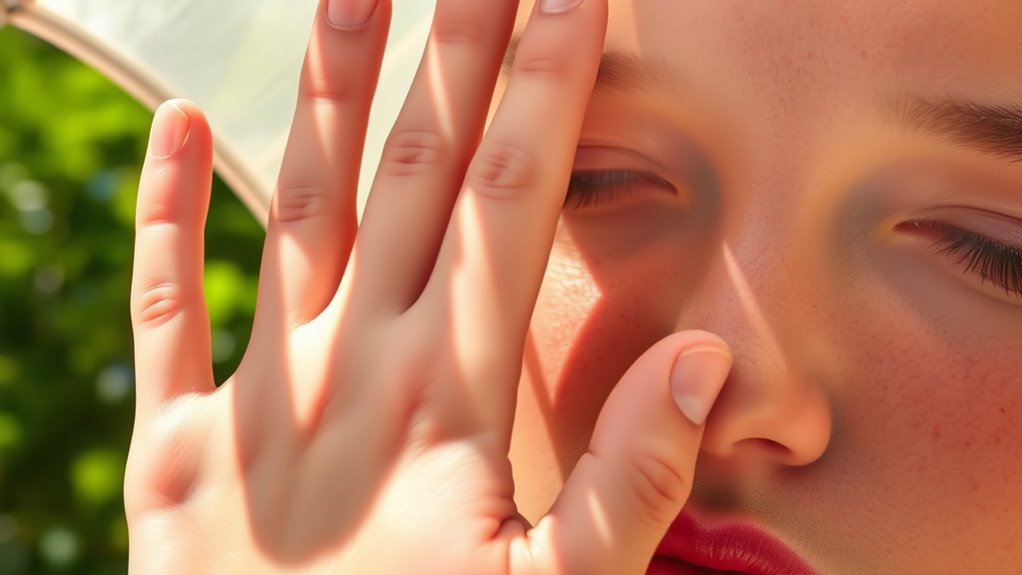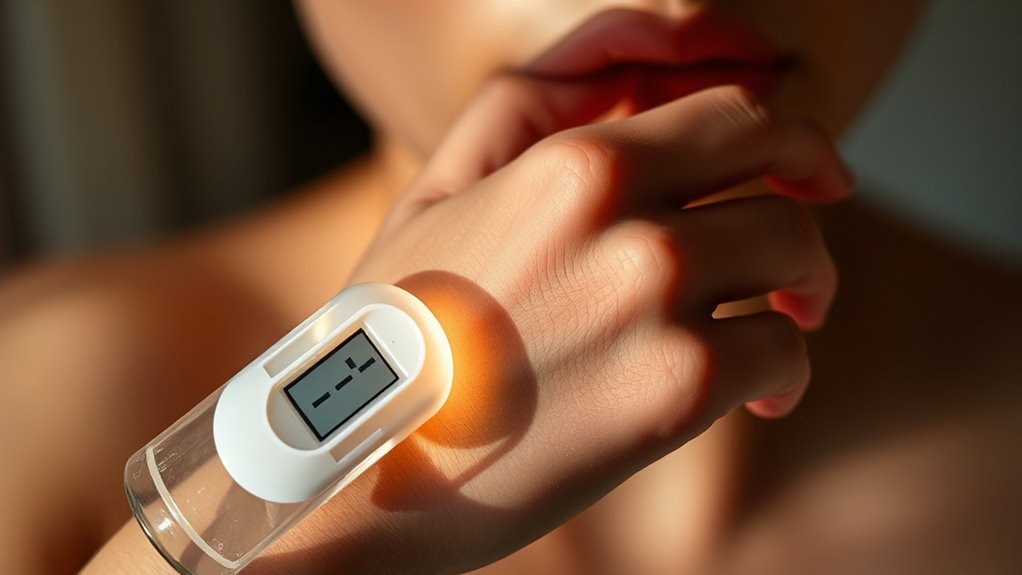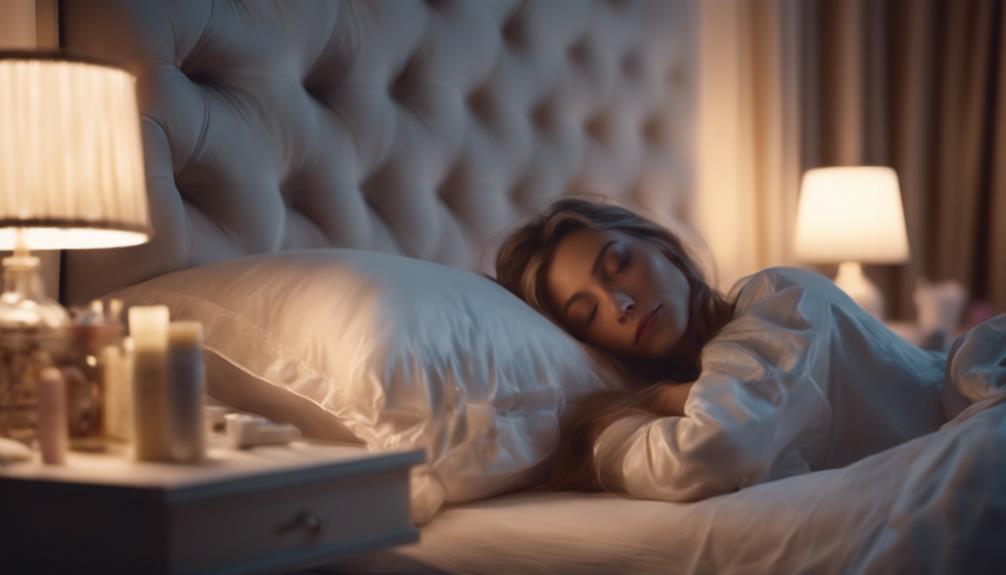The myth that UV rays only damage fair skin isn’t true. UV exposure affects all skin tones, regardless of pigmentation, though the visible effects may differ. Darker skin contains more melanin, offering some natural protection, but it can still sustain damage like skin cancer or premature aging. Everyone is at risk and needs proper sun protection. Keep going to discover why understanding this helps you stay safer in the sun.
Key Takeaways
- UV damage affects all skin types, not just fair skin.
- Melanin provides some protection but does not eliminate UV-related risks for darker skin.
- Skin cancer can develop in any skin tone, often diagnosed later in darker skin.
- Sunburns and UV-induced skin damage are more immediately visible in fair skin but occur in all.
- Universal sun protection is essential regardless of skin color to prevent harm and early detection.

Many people believe that fair skin is more susceptible to UV damage, but this isn’t entirely true. While skin pigmentation does play a role in how your skin responds to sunlight, it’s not the only factor. Your genetic susceptibility influences how your skin reacts to UV exposure, regardless of its color. Darker skin, which contains more melanin, offers some natural protection because melanin absorbs and disperses UV rays. However, this doesn’t mean individuals with darker skin are immune to UV damage or skin cancer. Everyone’s skin has vulnerabilities, and UV rays can cause harm across all skin tones.
Understanding skin pigmentation helps clarify why people with lighter skin often notice sunburns more quickly and intensely. Their reduced melanin levels mean less natural defense against UV rays, making them more prone to immediate damage like sunburns and peeling. But, it’s *vital* to recognize that people with darker skin can still develop skin cancers, often diagnosed at later stages because the symptoms can be less obvious. This delayed detection underscores the importance of sun protection for everyone, regardless of skin color.
Darker skin can hide skin cancer signs, so sun protection is crucial for all skin tones.
Genetic susceptibility also influences how your skin responds to UV exposure. Some individuals have genes that make their skin more vulnerable, regardless of pigmentation. These genetic factors can affect DNA repair mechanisms, immune response, and cell growth regulation, increasing the risk of skin damage and cancer. For example, if your family has a history of skin cancer, your risk is higher, no matter your skin tone. Conversely, some people may have genetic traits that provide better resilience against UV damage, even if their skin is lighter.
It’s a misconception that UV damage only affects fair skin. Sun exposure can harm all skin types, and the severity depends on a combination of skin pigmentation and genetic susceptibility. Protective measures, such as wearing broad-spectrum sunscreen, seeking shade, and avoiding peak sunlight hours, are essential for everyone. Recognizing that UV damage isn’t exclusive to fair skin helps you understand the importance of consistent sun safety practices. Whether your skin is light or dark, protecting it from harmful UV rays minimizes the risk of skin cancer and premature aging. Recognizing individual vulnerability is key to understanding why comprehensive sun protection is necessary for all skin types.
Frequently Asked Questions
Can Dark Skin Also Suffer UV Damage?
Yes, dark skin can suffer UV damage, even though melanin provides some protection. Many people believe UV only harms fair skin, but UV misconceptions can lead you to underestimate risks. Your melanin offers some defense, but it doesn’t make you immune. You should still wear sunscreen, seek shade, and avoid peak sun hours. Protecting your skin helps prevent damage and skin cancer, regardless of skin tone.
Does UV Exposure Affect Skin Aging in All Skin Types?
Yes, UV exposure affects skin aging in all skin types. Melanin provides some protection, but it doesn’t eliminate the risk of damage. Over time, UV rays break down collagen and elastin, reducing skin elasticity and causing wrinkles, regardless of skin tone. To keep your skin healthy, use broad-spectrum sunscreen daily, wear protective clothing, and seek shade. Everyone benefits from sun protection to slow aging and maintain youthful skin.
Are There Invisible UV Damages That Affect Darker Skin?
Think of invisible damage like an unseen villain lurking in the shadows. Yes, darker skin can sustain hidden UV damage that isn’t immediately visible. These invisible UV effects can lead to premature aging and skin issues over time, even if you don’t notice sunburns or dark spots. So, don’t underestimate the power of hidden UV rays—protect your skin daily with broad-spectrum sunscreen to guard against this silent threat.
How Does UV Exposure Influence Skin Cancer Risk Across Skin Tones?
UV exposure increases skin cancer risk for everyone, regardless of skin tone. Melanin provides some protection, but it doesn’t eliminate the danger. People with darker skin may have a lower risk initially, but they can still develop skin cancer, often diagnosed later. You should always use sun protection, because UV rays can cause invisible damage and increase cancer risk across all skin tones, not just fair skin.
Can UV Damage Be Reversed or Prevented in Darker Skin?
UV damage in darker skin can be minimized and even prevented through melanin protection, which offers some natural UV resilience. You should regularly use broad-spectrum sunscreen, wear protective clothing, and seek shade to reduce UV exposure. While the damage might not be fully reversible, practicing these habits helps preserve your skin’s health and can lower your risk of skin cancer. Remember, everyone benefits from sun protection, regardless of skin tone.
Conclusion
Remember, UV rays don’t pick and choose; they’re like invisible arrows that strike all skin types. Just because you have darker skin doesn’t mean you’re immune to damage. Protect yourself with sunscreen and proper clothing, because UV exposure is a silent thief that steals your skin’s health regardless of your skin tone. Think of your skin as a precious canvas—keep it protected, so your beauty can shine bright, no matter your complexion.








